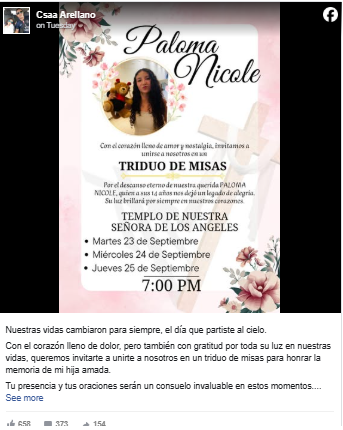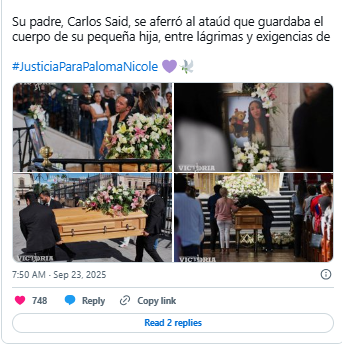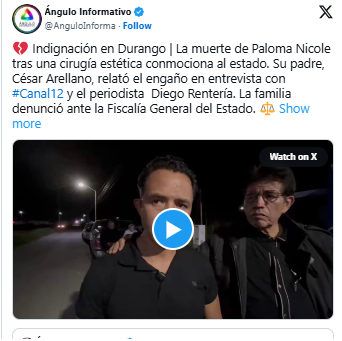An adolescent girl’s tragic death in Durango, Mexico has sparked outrage, legal complaints, and a judicial investigation into possible medical negligence, family responsibility, and consent protocols. The victim, Paloma Nicole Arellano Escobedo, aged 14, is alleged to have undergone aesthetic surgical procedures without her father’s knowledge. The case has prompted calls for accountability, stricter oversight in private clinics, and stronger protections for minors.
According to her father, Carlos Said Arellano, the surgery was performed on September 12, 2025, at the private Clínica Santa María in Durango. The procedures reportedly included breast implants, liposuction, and gluteal augmentation (a butt lift). The father claims that he was never asked for his consent; instead, he was told by the girl’s mother that Paloma had tested positive for COVID‑19 and that they planned to isolate in the mountains for a few days without phone signal.
In the days following the operation, Paloma Nicole developed serious complications. She was hospitalized after suffering what her father describes as a respiratory arrest and brain swelling. Medical staff placed her in an induced coma and intubated her. On September 20, physicians declared her brain dead. The official death certificate listed “cerebral edema from a respiratory illness” (or “illness”) as the cause of death, a characterization her father disputes.

During Paloma Nicole’s funeral, her father says that he discovered surgical scars and implants when viewing her body in the coffin. This discovery, he alleges, contradicted the previous account he had been given and strengthened the suspicion of unauthorized surgery. Soon after, he filed a formal complaint with the Durango State Attorney General’s Office demanding an autopsy (necropsy), the investigation of the surgeon, the clinic, the mother, and any others who may have been involved.

Authorities have confirmed the investigation is underway. The Durango State Prosecutor’s Office is analyzing clinical records, consent documentation, and surgical protocols. They have also ordered the necropsy to clarify the exact cause of death. The autopsy process is expected to take 10 to 20 days, partly because the body was prepared by a funeral home and some time has passed. The surgeon allegedly involved — identified as Víctor Manuel R. G. — has been suspended pending the outcome of investigations.

The case has generated significant public attention and political pressure. Governor Esteban Villegas Villarreal has publicly stated there will be no impunity if wrongdoing is confirmed. Civic groups and community members have organized a march in Durango to demand transparency and justice. The case has also intensified national debate about the regulation of cosmetic surgery on minors, informed consent, and the ethical responsibilities of medical practitioners and parents.
For Paloma’s father, the revelations have been profoundly painful. He insists that the death certificate’s quick issue and the initial explanation of illness were part of a cover‑up. He continues to press for a full and transparent investigation. Whether legal action will proceed depends largely on the findings of the necropsy and whether medical malpractice or criminal negligence can be established.
An adolescent girl’s tragic death in Durango, Mexico has sparked outrage, legal complaints, and a judicial investigation into possible medical negligence, family responsibility, and consent protocols. The victim, Paloma Nicole Arellano Escobedo, aged 14, is alleged to have undergone aesthetic surgical procedures without her father’s knowledge. The case has prompted calls for accountability, stricter oversight in private clinics, and stronger protections for minors.
According to her father, Carlos Said Arellano, the surgery was performed on September 12, 2025, at the private Clínica Santa María in Durango. The procedures reportedly included breast implants, liposuction, and gluteal augmentation (a butt lift). The father claims that he was never asked for his consent; instead, he was told by the girl’s mother that Paloma had tested positive for COVID‑19 and that they planned to isolate in the mountains for a few days without phone signal.
In the days following the operation, Paloma Nicole developed serious complications. She was hospitalized after suffering what her father describes as a respiratory arrest and brain swelling. Medical staff placed her in an induced coma and intubated her. On September 20, physicians declared her brain dead. The official death certificate listed “cerebral edema from a respiratory illness” (or “illness”) as the cause of death, a characterization her father disputes.

During Paloma Nicole’s funeral, her father says that he discovered surgical scars and implants when viewing her body in the coffin. This discovery, he alleges, contradicted the previous account he had been given and strengthened the suspicion of unauthorized surgery. Soon after, he filed a formal complaint with the Durango State Attorney General’s Office demanding an autopsy (necropsy), the investigation of the surgeon, the clinic, the mother, and any others who may have been involved.

Authorities have confirmed the investigation is underway. The Durango State Prosecutor’s Office is analyzing clinical records, consent documentation, and surgical protocols. They have also ordered the necropsy to clarify the exact cause of death. The autopsy process is expected to take 10 to 20 days, partly because the body was prepared by a funeral home and some time has passed. The surgeon allegedly involved — identified as Víctor Manuel R. G. — has been suspended pending the outcome of investigations.

The case has generated significant public attention and political pressure. Governor Esteban Villegas Villarreal has publicly stated there will be no impunity if wrongdoing is confirmed. Civic groups and community members have organized a march in Durango to demand transparency and justice. The case has also intensified national debate about the regulation of cosmetic surgery on minors, informed consent, and the ethical responsibilities of medical practitioners and parents.
For Paloma’s father, the revelations have been profoundly painful. He insists that the death certificate’s quick issue and the initial explanation of illness were part of a cover‑up. He continues to press for a full and transparent investigation. Whether legal action will proceed depends largely on the findings of the necropsy and whether medical malpractice or criminal negligence can be established.